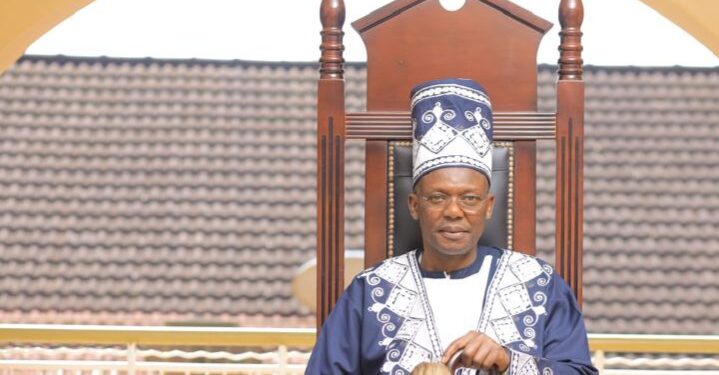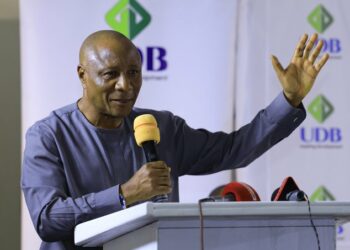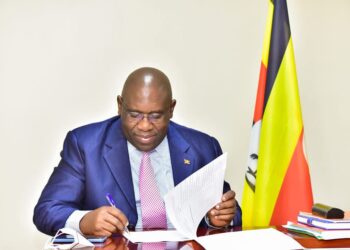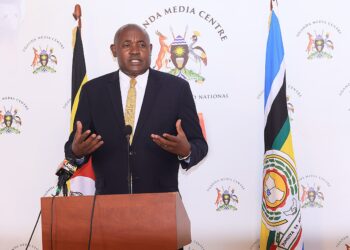The Lango Paramount Chief, known as Won Nyaci Me Lango His Royal Highness (HRH) Eng. Dr. Michael Moses Odongo Okune has stressed the importance of indigenous languages in promoting growth, development, and cultural heritage.
In a congratulatory message to the people of Lango on International Mother Language Day celebrated on 21st February, Eng. Okune says languages like Leb Lango are essential vehicles for conveying traditional practices, customs, and values from one generation to the next.
“…indigenous languages are a fundamental part of a community’s identity and cultural heritage, they contain unique historical perspectives and insights that are vital for our collective growth and development…”, he remarked.
The Lango Paramount Chief’s message remarks come as the world celebrates International Mother Language Day, a UNESCO-recognized event aimed at promoting linguistic diversity, multilingualism and language preservation.
He also has praised local musicians and artistes for their efforts in promoting the Leb Lango language and culture through their music.
These musicians have been composing and singing songs that entertain, educate, and raise awareness on crucial issues such as health, agriculture, education, sanitation, and hygiene, as well as wealth creation and social concerns like gender-based domestic violence and child abuse.
The Paramount Chief paid tribute to the late Moris Sirikinti Ekuka Ogwal Adongo, a renowned musician who dedicated his life to promoting local music and addressing topical issues.
Additionally, Odongo Okune, whose name is already published in the government gazette as the legitimate Won Nyaci Me Lango, also acknowledged the contributions of academics like Lira University’s Prof. Opio Okaka Dokotum, who have worked tirelessly to promote and preserve the Leb Lango language and Lango culture as a whole.
Prof. Opio Okaka Dokotum is spearheading a collaborative effort with a team of experts from various fields to author a comprehensive book titled “Lango Nation.” This highly anticipated publication is currently in the printing process.
The “Lango Nation” book promises to be a seminal work that showcases the rich cultural heritage, history, and traditions of the Lango people.
The book, according to impeccable sources will delve into various aspects of Lango society, including cultural practices and customs, historical accounts and legends, social and economic developments, religions, language and literature, art and craftmanship among others.
This comprehensive book will provide valuable insights into the Lango people’s way of life, customs, religions, and traditions, serving as a treasured resource for years to come.
According to ‘openlibrary.org,’ and archives, sons and daughters who have written books in Leb Lango include the late Akber Adoko Nekyon whose two books: Dyang Nguny Akello and Ojok Tye Kampala plus Dr Laury Ocen’s Twa Me Ngec Lango and Apit Arac Geno Bwo Ngor continue to inspire many people.
Others include Godman Okonye, who wrote A Simplified Lango-English, English -Lango dictionary, Ogwal Shaban, Wilson Ogwal Otim, John Peter Oduch Okall(Okello Nyok-Dyel and Okello Twon Ajanga).
Eng. Dr Michael Odongo Okune has also urged financial institutions, particularly banks operating in Lango, to incorporate the Lango language (Leb Lango) into their transaction facilities.
He expressed concerns that all bank Automated Teller Machines (ATMs) in the region currently use English and Luganda, which he describes as “exclusionary.”
He says that not all customers in the region understand English, let alone Luganda.
The Won Nyaci has called upon all corporate entities, including business people operating in Lango, to appreciate the local language by learning it.
He emphasized that the burden of effective communication lies with them, not the clients.
Quoting Rosetta Stone, a popular language-learning software company that has been helping millions of people learn new languages through immersive, interactive lessons, Okune says in today’s globalized market, language barriers can be a serious obstacle to business success.
“…therefore, companies that prioritize language accessibility can gain a competitive edge and build stronger relationships with their customers…” he said.
Eng. Dr. Okune commended MTN Uganda and Airtel Uganda for their efforts to use the native language to promote their services and products to the Lango people.
Furthermore, Won Nyaci Me Lango made a passionate appeal to local radio stations to prioritize local content over foreign programming, emphasizing the importance of using their platforms to deepen the local language and culture.
By doing so, Okune says these radio stations can play a vital role in promoting and preserving the rich cultural heritage of the Lango people. He also challenged the young generation of Lango people scattered across the country and the world to remain mindful of their cultural heritage.
He emphasized the importance of teaching their children about their cultural roots through language, traditional dress, and participation in cultural ceremonies like marriages.
The Paramount Chief cautioned against the dangers of cultural assimilation, warning that adopting foreign cultures and practices could lead to the erosion of their own cultural identity.
He also underscored the significance of preserving their cultural heritage, likening a people without culture to a bird without wings, unable to soar to great heights.
International Mother Language Day (IMLD) is a worldwide observance held annually on 21st February to promote linguistic and cultural diversity as well as to promote the preservation and protection of all language, particularly endangered ones.
The day was declared by the United Nations Educational, Scientific and Cultural Organization (UNESCO) in 1999, and the first international Mother Language Day was celebrated on 21st February,2000.
The date of 21st February was chosen to commemorate the language movement in Bangladesh where students and linguists fought for the recognition of Bengali as an official language in 1952.The movement culminated in the sacrifice of several students who were killed by police on 21st February 1952 while protesting for language rights.
Since its inception, International Mother Language Day has been celebrated worldwide to promote linguistic diversity and multilingualism and to recognize the importance of mother languages in education, culture, and identity.
It’s also celebrated to encourage language preservation and protection as well as foster international cooperation to promote language rights.
The day is celebrated through various events, including language festivals, cultural events, and language documentation projects to promote linguistic diversity and raise awareness about the importance of preserving and promoting mother languages.
Uganda’s educational policy on local languages as a means of teaching in schools has undergone significant changes over the years. Historically, Uganda’s language policy has been shaped by its colonial past, with English being the primary language of instruction.
In the pre-independence era, the British colonial government promoted the use of local languages in primary education with English introduced as a subject in the third or fourth year of primary school.
However, this policy was not consistently implemented, and English remained the dominant language of instruction.
In the post-independence period, Uganda’s language policy continued to evolve. The 1965 Ministry of Education policy stated that the vernacular language should be the medium of instruction for primary schools with English as a subject after the third year.
Currently Uganda’s educational policy promotes the use of local languages as a means of teaching in schools, particularly in primary education. The government has introduced a bilingual education policy which aims to promote the use of local languages alongside English.
The Makerere Conference on Language in 1944 recommended the use of English as a medium of instruction from the seventh year onwards, with local languages being used in the early years of primary education.
Overall, the Ugandan government has emphasized the importance of using local languages as a means of teaching in schools.
The country’s education policy aims to promote the use of local languages in education, particularly in the early years of primary education.
Do you have a story in your community or an opinion to share with us: Email us at editorial@watchdoguganda.com













